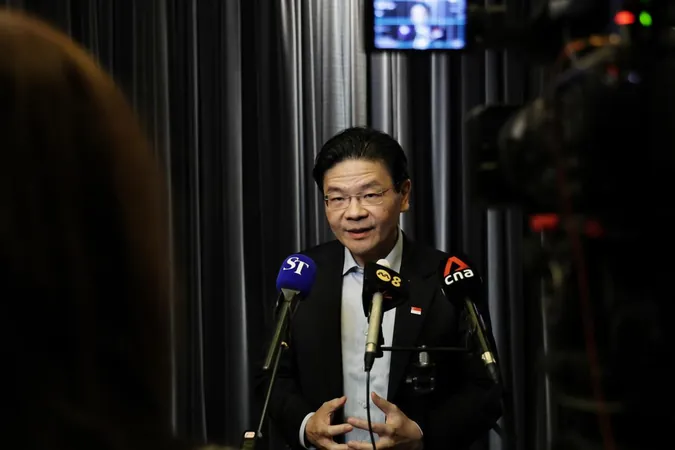
PM Wong Warns Against Blocking Rivals in Tech: Insight on US-China Relations
2025-06-26
Author: Siti
In a bold statement, Singapore's Prime Minister Lawrence Wong cautioned that attempting to block strategic rivals from accessing critical technologies and resources may backfire, emphasizing the fleeting nature of such leverage.
During his recent five-day visit to China, Wong explained how countries that impose restrictions often drive others to seek alternative solutions, diluting their initial power. "There will always be alternatives, be it high-end semiconductor chips or rare earth materials," he noted, suggesting that what seems like a competitive edge today could quickly diminish tomorrow.
In the ongoing US-China rivalry, the United States has imposed export restrictions on advanced chips intended for China, prompting Beijing to retaliate with its own bans on rare earth elements crucial for manufacturing and military equipment—actions both nations justify under the guise of security.
Wong expressed confidence in China's ability to adapt and innovate, predicting that they will strengthen their indigenous technology and research base in response to these restrictions. "China will redouble its efforts, as it is already doing, to emerge more resilient, and we see that happening," he asserted.
Recent negotiations between Chinese and American officials in London saw China easing some restrictions on rare earth exports, while maintaining a ban on military applications. Wong remarked that these developments signal a positive trajectory in US-China relations, hopeful for ongoing dialogue to stabilize trade tensions.
On how Singapore navigates the complex geopolitical landscape, Wong highlighted the importance of maintaining robust relationships with all nations. "Good relations are not just about polite gestures; they are built on Singapore’s relevance and contributions," he stated, notes that the city-state is viewed as a trustworthy intermediary.
As global tensions rise, Wong stressed Singapore's role in fostering cooperation amid isolationist tendencies, aiming to promote multilateralism for a collaborative future. At a World Economic Forum event in Tianjin, he urged like-minded countries to work together on pressing issues while remaining open to broader participation.
Despite US tariff threats and challenges facing the Chinese property market, Wong remains optimistic about China's economic prospects. He acknowledged that while not fully resolved, the situation has stabilized, and transformative potential remains, especially in rural areas.
Wong concluded his visit by meeting China's key leaders, including President Xi Jinping and Premier Li Qiang, fostering trust for future discussions. Eager to continue dialogue, he extended invitations for their visits to Singapore as both nations prepare to celebrate the 35th anniversary of their diplomatic relationship in 2025.
Overall, Wong's insights paint a complex picture of US-China ties, underscoring the importance of engagement, adaptability, and the potential for collaboration amid competition.




 Brasil (PT)
Brasil (PT)
 Canada (EN)
Canada (EN)
 Chile (ES)
Chile (ES)
 Česko (CS)
Česko (CS)
 대한민국 (KO)
대한민국 (KO)
 España (ES)
España (ES)
 France (FR)
France (FR)
 Hong Kong (EN)
Hong Kong (EN)
 Italia (IT)
Italia (IT)
 日本 (JA)
日本 (JA)
 Magyarország (HU)
Magyarország (HU)
 Norge (NO)
Norge (NO)
 Polska (PL)
Polska (PL)
 Schweiz (DE)
Schweiz (DE)
 Singapore (EN)
Singapore (EN)
 Sverige (SV)
Sverige (SV)
 Suomi (FI)
Suomi (FI)
 Türkiye (TR)
Türkiye (TR)
 الإمارات العربية المتحدة (AR)
الإمارات العربية المتحدة (AR)